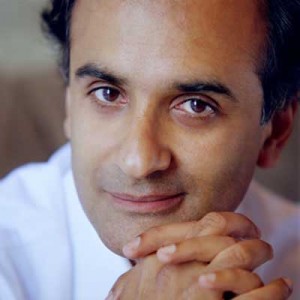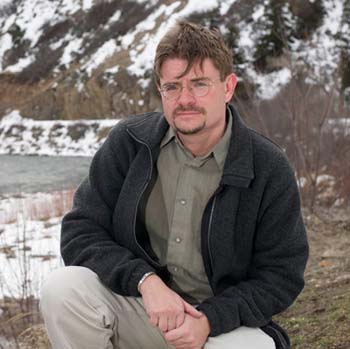
 The Dalai Lama calls himself “a simple Buddhist monk,” but he manages to create a stir wherever he goes. Pico Iyer’s biography,The Open Road, examines the Dalai Lama amid what he calls “the wild cacophony of cultures that’s our legacy in the 21st century.” I asked Iyer how he sees the Dalai Lama fitting into that cacophony and his role on the global stage.
The Dalai Lama calls himself “a simple Buddhist monk,” but he manages to create a stir wherever he goes. Pico Iyer’s biography,The Open Road, examines the Dalai Lama amid what he calls “the wild cacophony of cultures that’s our legacy in the 21st century.” I asked Iyer how he sees the Dalai Lama fitting into that cacophony and his role on the global stage.
Pico Iyer: I see him as somebody who is giving real truth to and living out the fact of the global neighborhood, who has had to put it to the test in terms of his own people. In almost every case historically where one company has been occupied, instantly the occupying force things that other is their enemy. He’s actually trying to cut through that and say the occupying force is our neighbor and we can’t come up with any solution for ourselves that doesn’t involve them. That’s kind of a radical way of not just thinking of Tibet and China but of the U.S. and Iraq. Almost every country in the world is caught up in some similar version of that.
I think part of the excitement is he’s seen how globalism fits perfectly with his version of Buddhism and interconnectedness. The whole world right now is bearing out precisely what the Buddha was talking about and thinking about a long time ago.
How so?
That we’re all interconnected and our destinies our interdependent. There’s no isolated being. This is a linked network and there’s nothing outside of that. And as a linked network, it’s literally like a world body as I see it, and as I see his describing it. If you really think of the world as your body, nobody wants to hit their own arm or blind themselves in one eye. I think literally he is saying Tibet is the left arm, China is the right arm. Tibet is the left eye, China is the right eye. It’s counterproductive to even begin to think of it as something outside ourselves. Nobody wants to literally shot themselves in the foot. I think that’s such a real notion to him because he’s breathed it since the age of 4, since the beginning of his Buddhist study. Reflexively, he sees the world without the kind of borders that most of us think in terms of, whether it’s religious borders or national borders.
You approach the subject of the Dalai Lama with a journalist’s skepticism.
As you can probably tell, the person who is moved by the Dalai Lama is much stronger in me than the skeptical journalist. But I thought the skeptical-but-open-minded-journalist position hadn’t really been covered very much. Most of what’s written about him is just reverential. Some of it is just uncritically dismissive. But the position of someone interested in what I could learn from Buddhism but not a formal Buddhist actually to me seemed to represent a large constituency.
That’s something that’s so revolutionary. It’s part of the new opportunity of the world, that this Dalai Lama can spend so much of his time talking to non-Buddhists and have so much to offer them which any of them can take and incorporate into her life whether she’s a Catholic or an anti-Buddhist or a Buddhist.
I suppose I felt that was an important section that no one had really claimed so far. And I felt in some ways I was writing a book to say the skeptical man on the Manhattan street. I felt that so much had been written for the people who were already interested in the Dalai Lama. But there are so many other people who know nothing about him and assume, oh he’s just a thing of fashion, he’s Hollywood’s plaything, who don’t realize he’s a very serious philosopher, that he’s one of the most ecumenical religious people. In some ways, I was trying to suggest that they couldn’t just write him off as much as they’d like to.
He’s achieved sort of a superstar status.
In spite of himself, I think. I remember asking him about that. In 1996, when the two big Hollywood movies were coming out, I went and had a long series of discussions in Dharamsala with him day after day about them, and he said at one point, “you know some people think of me as a celebrity,” and he was totally bewildered by the notion. I think that really doesn’t feature into the way he thinks about himself. But he said, “There’s nothing I can do about what everyone else says about me except make sure my own motivations are pure and make sure that I treat everybody exactly the same.”
In all the years of watching him, I can see that. I think part of the beauty of the Dalai Lama is that, when he walks into the White House, before he shakes hands with the president he’ll shake hands with all the bodyguards and say, “I remember you from eight years ago,” or, “Look at you. Where did you get that handkerchief?” It’s a small way of reminding us that we’re all really in the same boat.
After all the work that you’ve done, does he come across to you as more or less of a holy man?
More. And that too is a surprise. I began my book five years ago, and the one reservation I privately had is, if you really look hard at somebody you may see shadows or inconsistencies or smudges that make you think a little less of him. I would say that the more I look at him, the more I appreciate him. I have a much deeper, much greater appreciation for him now than five years ago, even though at that time I’d already known him for 28 years and written a lot about him. I sort of feel as if I’m just at the beginning of understanding. Each time I hear him, especially when he comes to Japan now, which is a great benefit to me because I get to travel with him in a very small group for the duration of his trip, so I really see him hour in, hour out, all his waking days, day after day, and each time I come out of one of those encounters, I feel I’ve understood that much more what’s going on in him and actually can therefore better appreciate the consistency and also the depth that lies behind those simple seeming statements.
The longer I spend with him the more I understand, and the more I understand, the more I see the depth of how much lies beneath what he translates into very accessible human terms.

